- Home
- Jim Thompson
The Golden Gizmo Page 15
The Golden Gizmo Read online
Page 15
“But—Yeah,” said Toddy, dully, “I suppose you’re right.”
Airedale slammed on his derby and started to turn away. “I don’t get it,” he snarled. “What are you hanging around for? Why ain’t you on your way?”
“I want to find out who killed Elaine.”
“Brother,” said Airedale, “that does it!”
“If I run,” said Toddy, “I’ve got to keep running. A few hundred or a few grand won’t be enough. I’ve got to be squared for life.”
“You’ve got something good lined up, huh?” said Airedale. “Why didn’t you say so in the first place? What—never mind. Can you pull it off by yourself?”
“It’s the only way I can do it. But I’ll need more time, Airedale. A couple of days, anyway. I really wanted three, but—”
“Two,” said Airedale. “I’d figured on twenty-four hours—enough time for me to clear out. But I’ll fix the gal for two; I’ll pay for that much. She may not get the stuff if I’m not here, but…Oh, hell. I guess it’ll be all right.”
They shook hands and Airedale left. A drink in his hand, Toddy sat down on the bed and mulled over the situation. Some of his normal fatalism began to assert itself. He grinned philosophically.
He undressed and climbed into bed. Lying back with his eyes open, he stared up into the darkness.
McKinley had promised not to have him tailed. It wouldn’t be necessary. Placed at strategic points, a mere handful of men, with the license number and description of a car, could follow its movements even in a city as large as Los Angeles. So there was only one thing to do—rather, two things. Change the license, change the description.
Milt would be stubborn. He’d do nothing unless he was made to—so he’d be made to. There’d be no spot-check, no tails, no T-men to interfere.
24
At nine-thirty the next morning, Toddy finished a leisurely breakfast in his room and called McKinley. The bureau chief sounded annoyed as he told Toddy where to pick up the car.
“You haven’t seen Miss Chavez?” he asked.
“Seen her? Why the hell would I? I don’t even know where—”
“Good,” said McKinley, in a milder tone. “She’s been after us to find out what happened to you. Wanted to see you in jail. Wanted to send you a note. I finally told her we’d turned you loose, and you’d left town.”
“That’s—that’s fine,” said Toddy.
“Yeah. You’ve got a job to do, Kent. You’ve got a wife. And Miss Chavez is as straight as they come.”
“And I’m not.”
“You’re not,” agreed McKinley. “You took the words right out of my mouth.”
He hung up the phone. Toddy slammed up his receiver, and finished dressing.
He was irritated by the conversation, but more than that, worried. Dolores knew about Elaine’s death. She’d be wondering why, after holding him, Toddy, three days, McKinley had suddenly freed him. She’d be sure that instead of merely leaving town, as McKinley had told her he had, he’d try to leave the country. She’d know that he’d need plenty of money to leave on and that he could only get it in one way.
As long as he was in jail, her deal with the government was safe. They wouldn’t care, when the news of the murder broke, whether she’d known about it or not. But if he skipped the country and committed another crime in the process of skipping…
No—Toddy shook his head. That wasn’t like her. She wouldn’t be concerned for herself, but him. She’d want to help him. And that, in a way, was as bad as the other. He couldn’t tell her anything. This had to be a one-man show.
Toddy took a final glance around the room, left it, and headed for the elevator.
The car was parked a few blocks away. He almost laughed aloud when he saw it. It was a medium-priced sedan, exactly like thousands of others of the same make to a casual observer. But Toddy was not observing casually, and neither would the T-men.
They’d hardly need to look at the license plates. The gray paint job, the white sidewall tires and the red-glass reflector buttons by which the plates were held would be sufficient identification. They’d be able to spot him two blocks away.
He slid under the wheel, and opened the dashboard compartment. The keys and the gun were there, and—he checked it quickly—the gun was loaded. Everything was as it should be.
He drove north and east, winding back and forth through a maze of side streets, avoiding anything in the nature of an arterial thoroughfare. He didn’t think McKinley would have his spot check set up so soon, but he might; and there wasn’t any hurry. He had the whole day to kill.
The houses he passed grew shabbier, fewer and farther apart. Many of them stood empty. Most of the streets were unpaved. It was one of those borderline, ambiguous areas common to most cities; an area surrendered to industry but not yet made part of it.
Toddy pulled onto a brick-paved street, and rounded a corner. On the opposite side of the street was an abandoned warehouse. On the right, the side he was on, was an automobile salvage yard, its high board fence set back to allow room for the dingy filling station at the front. A four-wheel truck trailer, all its tires missing, stood between the street and the closed-in grease rack.
Toddy drove into the inside lane of the station. He spoke a few words to a cold-eyed man in greasy coveralls and a skullcap made of an old hat. The man leaned against the gas pump. He looked up and down the street, said “Okay, Mac,” and jerked his head. Toddy drove into the greasing tunnel; then, as the rear wall slid up, into the yard beyond.
The job took two men three hours. When it was over Toddy himself, if he had not watched the transformation, would not have believed it was the same car.
A chromium grille disguised the radiator. The white sidewalls were replaced with plain tires. A sunshade sheltered the windshield. The roof and fenders of the car were dark blue; the rest of the body a glossy black. The red reflector buttons were gone, of course, as were the original license plates. The plate holders, with the substitute plates, had been moved to a new position.
Toddy paid over one hundred and fifty dollars, adding a five-dollar tip for each of the workmen. That left him with a little less than ten dollars, but that was more than enough for what he had to do. He wouldn’t be paying his hotel bill. He wouldn’t be going back to pay it.
He took one of the main streets back toward town, stopping once at a restaurant-bar, where he passed the better part of two hours, and again at a drugstore where he bought faintly tinted sunglasses. The glasses were disguise enough; not really necessary, for that matter. They’d be looking for a car, not a man.
It was dusk when Toddy reached the city’s business section, and a light drizzling rain was beginning to fall. Driving slowly, Toddy turned north up Spring Street.
Milt wouldn’t be buying gold, now. Moreover, he wouldn’t be receiving his nightly visit from the driver of the beer truck. He wouldn’t because there would be no more scrap gold to go out in the empty bottles.
Toddy swore suddenly and stepped on the gas. Almost immediately, he slowed down again. So what? What difference did it make if he passed by the hotel, the one where he and Elaine had lived? They didn’t know anything or want to know anything. All they were interested in was the rent which was paid through tomorrow.
He parked on Main Street, and sat in the growing darkness, smoking, listening to the patter of rain on the roof. For a panic-stricken moment he wondered whether Milt had already skipped; then grinned and shook his head. Milt would see no need to hurry. He’d move cautiously, safely, taking his time.
So that was all right. He wished he had nothing to worry about but that.
It was seven o’clock by the time he had finished his third cigarette. He tossed the butt out the window, transferred the gun from the dash compartment to his pocket, and started the car.
He drove up Main a block, swung over to the next street, drove back three blocks. On a dark side street he turned right and cut the motor. He coasted to a stop a few doors above the
entrance to the Los Angeles Watch & Jewelry Co., brokers in precious metals.
Luckily, he waited a moment before reaching for the door of the car. For Milt hadn’t stopped buying gold. Doubtless he felt that it was too soon, that he had to go through the motions a little longer. Or perhaps he was waiting for a weekend to beat it. At any rate, the door of the shop opened suddenly and a raincoated figure carrying the familiar square box dashed toward Main Street. A few minutes later, two other buyers came out together and trotted toward Main.
Crouched low in the seat, hidden by the rain-washed windows, Toddy waited ten minutes more. But no one else emerged from the shop, and, he decided, no one was likely to. It was too late.
He slid over on the seat and rolled down the window. He looked swiftly up and down the street. Then he rolled up the window, opened the door, and got out.
He walked close to the building fronts, pausing as he passed the one next to Milt’s shop. He could see in from there—see a scene so familiar, so associated with warmth and friendliness, that what he was about to do seemed suddenly fantastic and hateful.
Milt, seated back in his cage, the bright work light lifting him out of the shadows, draping him in a kind of golden aura. Milt…how could he…?
But he had. And his friendliness—his faked friendship—only made matters worse. Toddy reconnoitered the street quickly, strode to the door, and stepped inside. He was halfway down the long dark aisle before Milt could look up.
“Toddy! Iss it you? For days I have been worrying about…about…”
“Yeah,” said Toddy. “I’ll bet you have.”
He moved swiftly through the wicket of the cage, and brought a hand down on the gooseneck of the lamp. It flattened against the workbench, casting its light upon the floor. No one looking in from the street would see anything.
Milt had started to rise, but Toddy shoved him back in his chair. He seated himself, facing the little jeweler.
“That’s right,” he nodded grimly. “That’s a gun. If you don’t think I’ll use it, give me a little trouble.”
“But I do not understand! Trouble? Have ever I—” He broke off, staring into Toddy’s cold set face, and abruptly his mask of bewildered innocence vanished. “Stupid Toddy. Oh, so stupid. At last he awakens.”
“Get it out,” said Toddy. “Every goddamned nickel. And don’t ask me what.”
“Ask?” Milt shrugged. “I am not given to foolish chatter. As for it, I have anticipated you. It is already out.” He started to reach beneath the workbench, then paused abruptly, arm half-extended.
Toddy nodded. “Go ahead. Just don’t try anything.”
He took the heavy briefcase that Milt drew out, laid it on the bench, and slipped the catch. He shook it slightly, his eyes swerving from the jeweler to the bench. There was one packet of scat money—fives, tens and twenties. The rest of the horde was in thousand-dollar bills, dough too hot for the dumbest burglar to touch. Milt couldn’t spend it in this country. Abroad, there’d be no trouble. Violation of income tax laws was not an extraditable offense.
“Your visit was most inopportune,” sighed Milt. “A few hours more and I would have been gone.”
“You’re still going. You’re going out to Venice with me, out to the beach. We’re going to have a nice long talk.”
“We can do that here. We are alone on this street. No one will come in.”
“Someone will tomorrow.”
“But…Oh,” said Milt. “Still, is it necessary, Toddy? You have the money. By tomorrow, you can be very far away. In any case, my hands are tied. I dare not complain.”
Toddy jerked his head. “I’ll be a lot farther away the day after tomorrow. And you’d talk, all right. Everyone that’s had anything to do with me will get a going-over. I’ve been in jail, and—”
“Yes. I know.”
“Then you probably know how I got myself sprung. You know I can’t keep my bargain unless I dig up the guy that killed Elaine.”
“Which you cannot do,” said Milt. “Not”—he added—“that you have any intention of keeping your bargain. Another, perhaps, almost any other man, but not you.” He grinned faintly, his hands clasped over his fat stomach. “You do not want to keep your bargain with the government agents. You cannot keep it. A confession you may extract from me, but it will be worthless. I can prove that I did not kill Elaine or cause her to be killed.”
“Maybe.” Toddy studied the bland, chubby face. “Maybe,” he repeated, “but I’m taking you with me, anyway. No one knows how you worked this setup here. I’m going to find out, just in case I ever get back to this country. If you come clean with me I may just tie you up and dump you somewhere. Some place where you’ll be found in a few days. Otherwise…”
He gestured significantly with the gun. Milt laughed openly.
“Yes? You were thinking of the dunes, doubtless? Oh, excellent! It will be a wonderful place to leave a body…or should I say two?”
“Two?” Toddy frowned. “What the hell are you talking about?”
“Bodies,” said Milt. “Yours and Miss Chavez’.”
Toddy’s chair grated against the floor. “Damn you! If you’ve hurt that—”
Behind him the curtains rustled faintly. Something cold and hard pushed through them, pressed into the back of his neck.
Milt nodded to him, solemnly. “That is right, Toddy. Sit still. Sit very, very still. Yes, and I think I shall just take your gun. Miss Chavez”—he glanced at the clock—“should be here at any moment. Your hotel, your former hotel, I should say, was kind enough to refer her to me. I suggested that she return here tonight when you, in your hour of dire emergency, would most certainly come to me for aid. So…So”—the front door opened and clicked softly shut—“she has come.”
She came down the aisle, hesitantly at first, then with quick firm steps as she saw the two men in the dim glow of the lamp. “Toddy! I am so glad I—I—”
“Do not scream,” said Milt. “Do not move.”
He thrust himself up from his chair, moved around Toddy and out through the wicket. Toddy waited helplessly, his hands carefully held out from his sides.…This was the one thing he hadn’t foreseen—the fact that Milt might have a confederate. Who the hell could it be, he wondered, and why had Milt behaved as he had? What had he hoped to gain by appearing defenseless, letting Toddy talk?
Toddy didn’t know, and there was no time now to think about it. The person behind him came through the drapes, and the gun barrel dug viciously into his neck.
He got up slowly. He looked into Dolores’ pale strained face, and tried to grin reassuringly. He heard Milt’s chuckle as he pushed her forward through the wicket.
He turned around.
“Hi-ya, prince,” said Elaine.
25
Through a blinding downpour of rain, the car moved cautiously, steadily westward. Toddy drove, bent over the wheel, staring through the windshield. Dolores was at his side, Milt and Elaine in the rear seat. It was almost an hour before the city proper was left behind them, and silently, except for the humming of the tires and the wet lash of the windshield wipers, they went rolling down Olympic Boulevard. It ran in practically a straight line to the ocean. There was almost no traffic on it now.
Toddy eased up on the gas a little more. He’d outsmarted himself this time. In outwitting McKinley, he’d handed Milt a setup. Now there was nothing to do but stall, postpone the inevitable as long as possible.
The air was thick with the odor of Elaine’s cigarettes and whiskey. She coughed, choked, and a fine spray showered Toddy’s neck. Milt cleared his throat, apologetically.
“Perhaps, Liebling, it might be well to…”
“What?” said Elaine. “You trying to tell me when to take a drink?”
Milt hesitated. Toddy felt a faint surge of hope. If she and Milt should start fighting, if she’d only throw one of those wild tantrums of hers…But she didn’t. Moreover, Toddy knew, she wasn’t going to.
“If you put it that
way,” Milt said, coldly, “yes. Rather, I am telling you when not to drink. And I am telling you that now. There is too much at stake. Later it will be all right; I would be the last to interfere.”
There was a moment of silence. Then, “All right, honey,” Elaine said meekly. “You just tell li’l Elaine what to do and that’s what she’ll do.”
“Good,” said Milt complacently. “We must give our Toddy no advantage, hein?”
“Whatever you say, honey.”
“He is a very intelligent man,” Milt went on. “He tells me in substance how much time the police have given him. He informs me, indirectly, that there is no one following his movements. Finally, by a reverse process, he makes excellent suggestions for disposing of himself. Do you wonder that I fear him, this intellectual giant?”
Elaine’s giggle tapered off to a troubled note. “Yeah, but honey. I don’t—”
“Consider,” Milt continued, enjoyably. “Everything he is told, yet nothing he sees. He knows that Alvarado has told the anonymous gold-supplier of the theft of the watch. He knows his wife detests him, and he is thoroughly familiar with her talents as an actress. But does he draw any conclusions from these things? Not at all. He is baffled by her strange death and the subsequent disappearance of her body. It does not occur to him that she had simulated death, that she followed him down the fire escape taking the watch with her.”
Dolores half-turned in the seat and her eyes flashed. “He is not stupid! He trusted you! It is easy to—”
“Of stupidity,” said Milt, “you are hardly a competent judge. You who revealed his release from jail to a stranger. Now if you wish to take full advantage of your remaining minutes of consciousness, you will turn around.”
“You are too cowardly! I—”

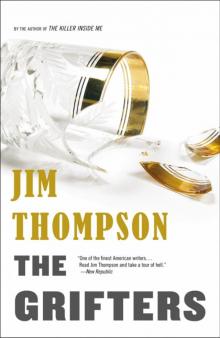 The Grifters
The Grifters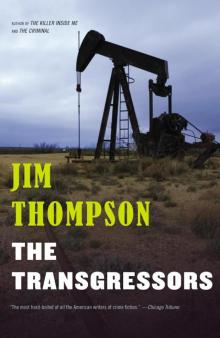 The Transgressors
The Transgressors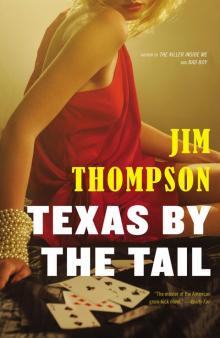 Texas by the Tail
Texas by the Tail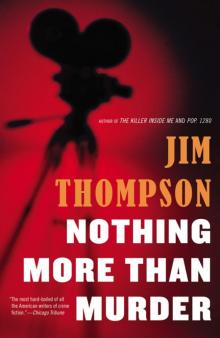 Nothing More Than Murder
Nothing More Than Murder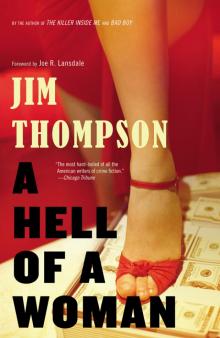 A Hell of a Woman
A Hell of a Woman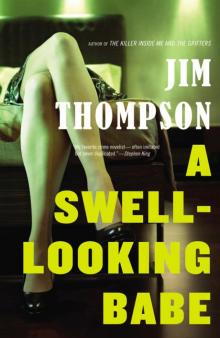 A Swell-Looking Babe
A Swell-Looking Babe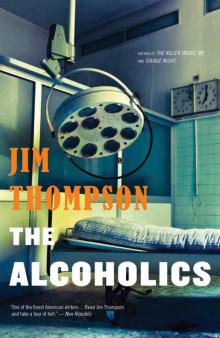 The Alcoholics
The Alcoholics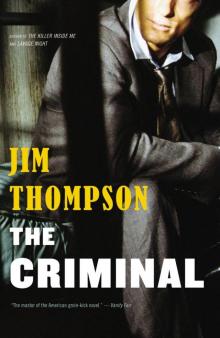 The Criminal
The Criminal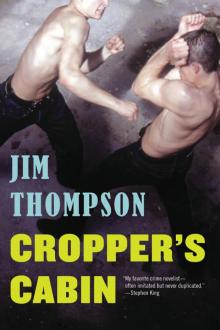 Cropper's Cabin
Cropper's Cabin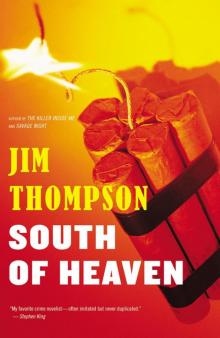 South of Heaven
South of Heaven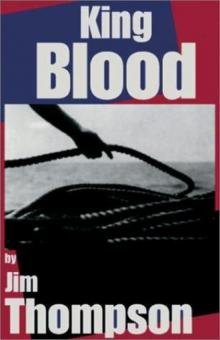 King Blood
King Blood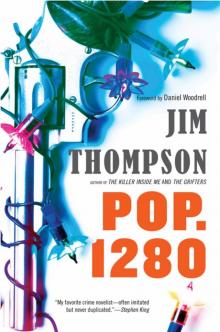 Pop. 1280
Pop. 1280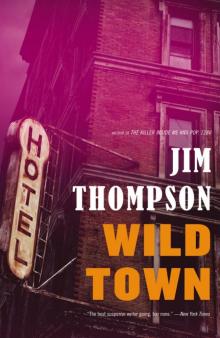 Wild Town
Wild Town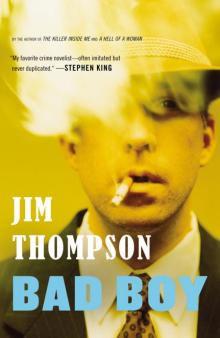 Bad Boy
Bad Boy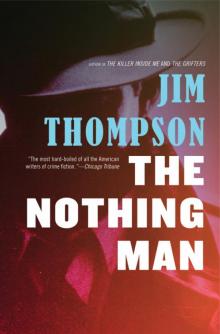 The Nothing Man
The Nothing Man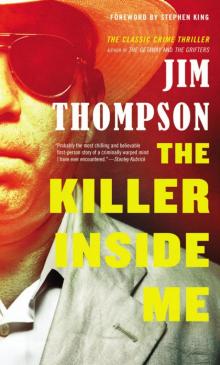 The Killer Inside Me
The Killer Inside Me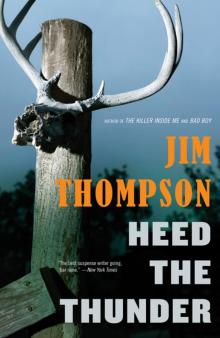 Heed the Thunder
Heed the Thunder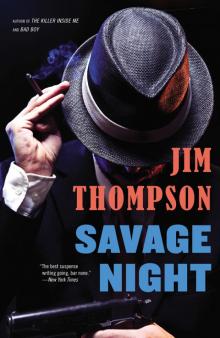 Savage Night
Savage Night Recoil
Recoil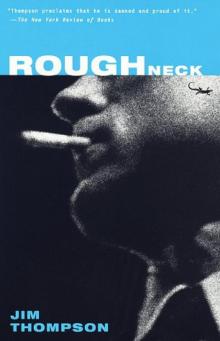 Roughneck
Roughneck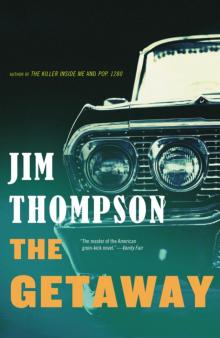 The Getaway
The Getaway